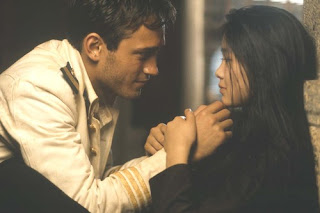Indochine
Distributed by: Bac Films
Released: April 1992
Country: France
Vietnam has a really complicated history. Similarly, Indochine, a movie set in the
1930’s in what we now call Vietnam, is a really complicated film. Long before most Americans had even heard of
the place, Indochina was a colony of France that consisted of much of Southeast
Asia, including Vietnam. It’s in this
setting that we find Élaine Devries, an extremely wealthy single French woman,
running her father’s plantation. When
she learns that her Vietnamese friends have died in a plane crash, she makes
the decision to raise their orphaned toddler daughter as her own, renaming her
Camille.
Élaine is played with the air of privileged aloofness
by French actress Catherine Deneuve, and the movie centers on Élaine and
Camille’s relationship as the girl grows into pretty young Asian woman in the
world of her mother’s French aristocracy.
Enter a young French officer, Jean-Baptiste Le Guen, arrogant and
ambitious, with an eye for Élaine. The
two have a sexual relationship that is mostly kept under wraps, with
Jean-Baptiste being in love with Élaine and Élaine mostly looking to have
Jean-Baptiste fill her in . . . on what the current military situation is in
Indochina. Élaine is not a bad person,
really, but she is Colonial France personified—not meaning harm to the
Vietnamese people that work for her, but probably not understanding that they
are not just around to meet her needs.
 |
| Camille and Elaine |
Years go by.
Camille is now a young woman attending a private school. One day, while trying to escape, a Vietnamese
prisoner is shot and runs into Camille, knocking her unconscious and getting
blood all over her neat school uniform.
Who should come to the rescue but Jean-Baptiste, who while attending to
her gets a full-on view of her emerging womanhood. Well, one of her emerging womanhoods. Camille, as would happen to any girl getting
wiped down by a soldier while coming to, falls deep for Jean-Baptiste. Camille’s a little young at this point, but
this incident is going to set up a Mrs. Robinson-Elaine (meaning Elaine from The
Graduate, not Élaine played by Deneuve) showdown down the road.
If you think I am giving too much away, think again—I
am just scratching the surface of this convoluted, meandering plot. One theme emerges throughout—French
colonialism is on the decline, and will soon be only a memory on which one can
make long, confusing movies starring Catherine Deneuve. The story of Élaine, Camille, and
Jean-Baptiste is only a device to show this cultural decline, one that will
lead to Japanese occupation and war and Americans evacuating by helicopter off
Saigon buildings. I may be getting ahead
of myself there, which is what I wanted to do while watching this. The movie ends with an unsatisfying epilogue
set in 1954, the point at which the French finally did pack up and leave
Vietnam.
This movie is not without its merits. It’s beautifully shot in the imperial city of
Hue, the one-time
capitol city of Vietnam.
Hue was largely destroyed in the Tet Offensive in 1968, but restoration
has been taking place there for many years, and the filmmakers found enough
terrific- looking spots to put on film. The
film, of course, features France’s most famous actress, Catherine Deneuve. She doesn’t look much different in this 1992
film than she did her breakout film, the musical The Umbrellas of Cherbourg, made
almost 30 years earlier. But
unfortunately, looks do not a movie make.
This one felt like a missed opportunity at being meaningful epic on the
topic. Instead, it drifted and lost its
way more than once, with no good resolutions.
Kind of like Vietnam itself.
 |
| Jean-Baptiste and Camille |
The
Title: Indochina under
French rule included Vietnam, Cambodia, and Laos. Prior to that, the “Indo” in Indochina
included Thailand, Burma, and parts of what are now India.
The
Culture: This story
focuses on the colonialists rather than the native people, so this is about the
aristocracy more than the population it exploited.
 |
| Catherine Deneuve: The Umbrellas of Cherbourg |
Agenda
Danger: Basically your
run-of-the-mill class warfare stuff. A
main character or two sees
the unfairness and oppression that is colonialism,
thus justifying the Communist takeover later.
There is nothing that hits you over the head, but the message is
basically that the French were exploitative.
Best
Picture that year: Unforgiven
Rating: There’s little doubt that
for the most part the French, and then the Americans, regretted getting
involved in Vietnam in the first place.
The Americans in particular went in with good intentions and an optimism
that the effort would be worth it. That’s
how I went into watching this film. And
about half-way through, I started thinking of a way to get out of watching the
rest, but with honor. Unfortunately, in
the end, what little I got out of it wasn’t worth it. Just like Vietnam.

No comments:
Post a Comment